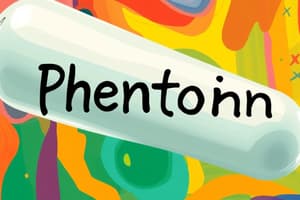Podcast
Questions and Answers
What is the therapeutic class of Phenytoin?
What is the therapeutic class of Phenytoin?
- Antibiotic
- Analgesic
- Antiseizure drug, antidysrhythmic (correct)
- Antidepressant
What is the pharmaceutical class of Phenytoin?
What is the pharmaceutical class of Phenytoin?
Hydantoin; sodium influx-suppressing drug
How does Phenytoin act on the Central Nervous System?
How does Phenytoin act on the Central Nervous System?
Acts by desensitizing sodium channels responsible for neuronal responsivity.
What types of seizures is Phenytoin effective against?
What types of seizures is Phenytoin effective against?
What is a critical administration alert for intravenous Phenytoin?
What is a critical administration alert for intravenous Phenytoin?
What is the pregnancy category of Phenytoin?
What is the pregnancy category of Phenytoin?
What are some adverse effects of Phenytoin?
What are some adverse effects of Phenytoin?
Match the following conditions with their contraindications for Phenytoin:
Match the following conditions with their contraindications for Phenytoin:
Which of the following drug interactions should be noted with Phenytoin?
Which of the following drug interactions should be noted with Phenytoin?
Phenytoin will lessen the effects of oral birth control.
Phenytoin will lessen the effects of oral birth control.
What food/herb interactions are notable with Phenytoin?
What food/herb interactions are notable with Phenytoin?
What is the typical action taken in case of a Phenytoin overdose?
What is the typical action taken in case of a Phenytoin overdose?
Flashcards are hidden until you start studying
Study Notes
Phenytoin Overview
- Phenytoin (Dilantin) is classified as an antiseizure drug and antidysrhythmic.
- Falls under the hydantoin pharmaceutical class and acts as a sodium influx-suppressing medication.
Mechanism of Action
- Desensitizes sodium channels in the Central Nervous System, reducing neuronal excitability.
- This action prevents the propagation of electrical discharges that lead to seizures.
Indications for Use
- Effective for most seizure types, excluding absence seizures.
- Exhibits antidysrhythmic properties similar to lidocaine.
- Unlabeled use includes management of digitalis-induced dysrhythmias.
Administration Guidelines
- Only mix intravenous formulations with regular saline; infuse at up to 50 mg/min.
- Mixing with other solutions causes precipitation.
- Always prime or flush with saline to reduce irritation.
- Avoid intramuscular injections; instead, use a large vein or central venous catheter to minimize tissue damage and risk of purple glove syndrome.
Pregnancy and Safety
- Classified as a Pregnancy Category D medication, indicating potential risks.
Adverse Effects
- Possible dysrhythmias include bradycardia and ventricular fibrillation.
- Severe CNS reactions may involve headache, nystagmus, ataxia, confusion, and slurred speech.
- Long-term use could lead to peripheral neuropathy and various blood dyscrasias like agranulocytosis and aplastic anemia.
- Severe skin reactions include rashes, exfoliative dermatitis, and Stevens-Johnson Syndrome.
- Connective tissue issues like lupus erythematosus and gingival hypertrophy may occur.
Contraindications
- Injectable form is contraindicated in shock, coma, and patients with depressed vital signs.
- Tablet form should not be given to infants under 6 months, patients with acute narrow-angle glaucoma, or those who have had MAOI therapy within 14 days.
Drug Interactions
- Numerous interactions with oral anticoagulants, glucocorticoids, and food supplements like folic acid and calcium.
- May impair efficacy of drugs such as digitoxin, theophylline, and oral contraceptives.
- Co-administration with tricyclic antidepressants can provoke seizures.
Considerations for Female Clients
- Patients should be informed that Phenytoin reduces the effectiveness of oral contraceptives, necessitating alternative contraception.
Additional Interactions
- Alcohol and CNS depressants should be avoided due to enhanced sedative effects.
Laboratory Monitoring
- Can lead to falsely low dexamethasone and metyrapone test results.
- Serum glucose levels may increase, while protein-bound iodine and urinary steroid levels may decrease.
Herbal and Food Interactions
- Certain herbal laxatives may lead to increased potassium loss, while Ginkgo may diminish therapeutic efficacy.
Overdose Management
- No specific antidote; treatment generally supportive.
- Removal of the drug may be achieved through gastric lavage or activated charcoal.
- Focus on maintaining airway, breathing, and monitoring phenytoin blood levels while addressing adverse symptoms.
Studying That Suits You
Use AI to generate personalized quizzes and flashcards to suit your learning preferences.




